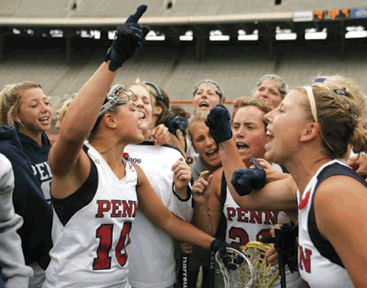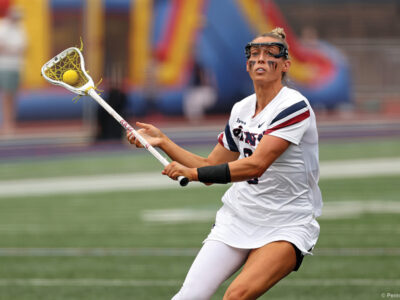
By David Porter | Back in 2000, when Penn athletic director Steve Bilsky W’71 was looking for a new head coach to invigorate Penn’s cellar-dwelling women’s lacrosse program, he gave the job to Karin Brower, a former assistant with a Princeton program that had won or shared four Ivy titles in a span of five years in the mid-1990s. Though the process of instilling that kind of winning attitude has taken a bit longer than she might have liked, this spring Brower’s transformation of Penn’s program culminated with a season that will be remembered long after the sting of a 12-2 loss in the national semifinals to Northwestern has eased.
The 2007 Quaker team seemed determined to obliterate any traces of their former second-class status, both in the Ivy League and on the national stage. Their appearance in the Final Four was the program’s first—Penn hadn’t even qualified for the NCAA Tournament since 1984—and they won the school’s first Ivy League title since the 1982 team led by all-time leading scorers Sherry Marcantonio C’83 SW’85 and Lisa Romig C’82 accomplished the feat. Oh, and there also was a school-record 16-2 win-loss mark, a first-ever 7-0 Ivy League record, and a No. 2 national ranking.
“We came into this program freshman year with Karin instilling in us the belief that we could win a national championship,” senior defender Sarah Eastburn said during an emotional press conference after the loss to Northwestern’s Wildcats, who won their third straight national title two days later. “We worked incredibly hard to achieve that goal. This is just the next step.”
Brower had arrived at Princeton at the tail end of the Tigers’ period of Ivy dominance, but was able to witness firsthand the effort that went into producing an elite program. She encountered a different set of challenges at Penn, which had lost 12 of 13 games the previous year and had had one overall winning record since 1984.
“I was sort of amazed at the lack of commitment,” Brower recalled. “It wasn’t the kids’ fault, but I don’t think they understood all the time it took, all the dedication. Just about things like discipline, being on time, respecting your locker room. They were a great group, but there’s a way to do things, and I had to train them in having pride in what they were doing.”
That training didn’t happen overnight, Brower acknowledged. Changing hearts and minds is at least as important as recruiting a better class of players, yet neither can work without the other. A 6-8 record (yet still 1-6 in the Ivy League) in her first year was followed by an 8-9 mark in 2001; as Brower’s teams experienced the satisfaction of winning a few more games, she set about raising the bar ever higher. Last year the team appeared poised to take the next step when they won five of their first seven games, but then they wound up losing three more times by a total of eight goals and failed to reach the NCAA Tournament despite finishing 10-6. An 8-7 loss at Princeton was the crushing blow, but Brower came away encouraged at her players’ response.
“When I came here, the Princetons and Dartmouths were killing us,” she said. “It was, ‘Can we hang with them for 20 minutes?’ These girls were not recruited by those programs, and they didn’t really believe they could beat them. But last year was a huge step in that the girls believed they should have won some of those games.”
That belief carried over into 2007 as the Quakers won 13 of 14 games in the regular season, sparked by a defense led by Eastburn and All-Ivy honorees senior Karen Jann, sophomore Hilary Renna, and goalkeeper Sarah Waxman, a junior, that held 11 of its first 12 opponents under 10 goals. A thorough domination of No. 12 Johns Hopkins in a 12-4 win on March 28 confirmed to Brower that her team was poised to do great things. The players responded with back-to-back wins over former nemeses Dartmouth and Princeton, with the latter especially sweet for Brower since it came against former mentor Chris Sailer and clinched a tie for the Ivy title.
Sailer graciously offered to give Brower the league trophy before Penn traveled to Brown on April 21 so she could present it to her players on the field … but only if they won and clinched the title outright. Penn led by just 3-0 at halftime against the unranked Bears but eventually coasted to a 12-4 win.
The stars were in alignment for the Quakers after wins against No. 7 Syracuse, Boston University, and No. 5 Maryland landed them in the Final Four at Franklin Field on Memorial Day weekend. Unfortunately, opposing them was top-ranked Northwestern, which had handed them their only loss of the season on March 9. This time, the Wildcats put on the pressure from the opening whistle and never eased up.
Penn had overcome deficits of five and four goals, respectively, in the wins against Syracuse and Maryland, but there was to be no stopping Northwestern, which held the Quakers scoreless until nearly four minutes into the second half while it built a 10-0 lead. Penn’s defense actually performed admirably, given the fact that the Wildcats controlled the ball for long stretches. A few missed chances in the first half might have made a difference in the final margin but not the outcome.
Eastburn, Jann, Chrissy Muller, and Caitlin McDonnell played their final games for Penn, and Muller choked up later when she declared, “It’s really sad to leave, and it’s sad that it has to end this way.”
Brower noted that the statistics for the game—shots on goal, ground balls, draws, clears—were virtually even, which made it all the more frustrating that the Quakers didn’t acquit themselves better on the scoreboard. Still, the big picture offered much to be proud of.
“Nobody thought we would be in the tournament, much less the Final Four,” she said. “They’ve set a standard for what we want Penn lacrosse to be.”
David Porter C’82 writes for the Associated Press.




